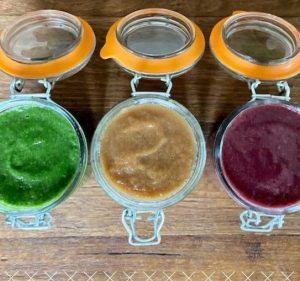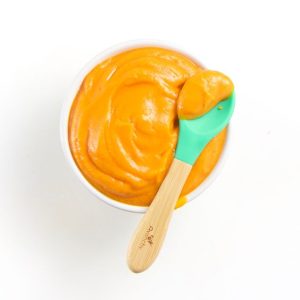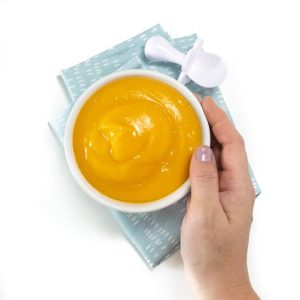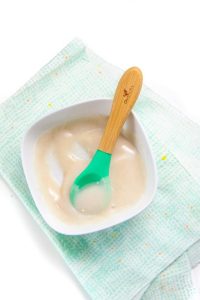Constipation is a common issue that can affect babies of all ages. It can be frustrating for both you and your little one. If your baby is constipated, you might be wondering what you can do to help. In some cases, a change in diet can be helpful. This article explores the use of vegetable puree for baby constipation relief.
Understanding Baby Constipation
Constipation in babies means they are having infrequent bowel movements or difficulty passing stool. This can be uncomfortable for your baby and cause them to fuss or cry. Most babies poop at least once a day, but some may go a few days in between bowel movements. This isn’t necessarily constipation if your baby is still passing soft stools and isn’t showing signs of discomfort.
Signs of Constipation in Babies
Here are some signs that your baby might be constipated:
- Hard, dry stools
- Straining or crying during bowel movements
- Less frequent bowel movements than usual (more than 3 days without a poop)
- A swollen belly

Causes of Baby Constipation
There are many reasons why a baby might become constipated. Here are a few common causes:
Diet:
If your baby is just starting solids, their digestive system may be adjusting to new foods. Not getting enough fluids can also lead to constipation.
Formula changes:
Switching to a new formula can sometimes cause constipation.
Medical conditions:
In some cases, constipation can be a sign of an underlying medical condition. If you are concerned about your baby’s constipation, talk to your doctor.
Treating Baby Constipation at Home
There are a few things you can try at home to help relieve your baby’s constipation:
-
Warm bath: A warm bath can help relax your baby’s muscles and make it easier for them to pass stool.
-
Gentle tummy massage: Gently massaging your baby’s tummy in a clockwise motion may help stimulate their bowels.
-
Bicycle legs: Lay your baby on their back and gently move their legs in a bicycling motion. This can help stimulate the bowels.

Dietary Changes for Baby Constipation
If your baby is constipated, you may want to make some changes to their diet. Here are a few tips:
-
Offer more fluids: Make sure your baby is getting enough fluids. Breastmilk is the best source of fluids for babies under 6 months old. If your baby is formula-fed, offer them extra water throughout the day.
-
Start with certain fruits: Fruits like pears, prunes, and peaches can be helpful for relieving constipation. These fruits contain fiber, which can help soften stools.
-
Vegetable puree: Vegetable purees made from prunes, peas, or sweet potatoes can also be helpful. These vegetables are also good sources of fiber.
Using Vegetable Puree for Baby Constipation
Vegetable puree can be a safe and effective way to help relieve your baby’s constipation. Here are some things to keep in mind:
-
Age: Wait until your baby is at least 4 months old before introducing solid foods, including vegetable puree.
-
Start slowly: Start with a small amount of puree, such as 1 or 2 tablespoons, once a day. You can gradually increase the amount as tolerated.
-
Choose the right vegetables: Look for vegetables that are high in fiber, such as prunes, peas, or sweet potatoes.
-
Make your own puree: You can easily make your own vegetable puree at home. Simply steam or boil the vegetables until soft, then puree them in a blender or food processor.
-
Talk to your doctor: If your baby’s constipation is severe or does not improve with home treatment, talk to your doctor.
This article is provided for informational purposes only and should not be taken as medical advice. Always talk to your doctor before making any changes to your baby’s diet or if you are concerned about your baby’s constipation.

Choosing the Right Vegetables
Look for vegetables that are high in fiber content to help with constipation. Here are some good options:
-
Prunes: Prunes are a well-known natural remedy for constipation. They are packed with fiber and sorbitol, a natural laxative. Note: Wait until your baby is 6 months old before introducing prunes.
-
Peas: Peas are another good source of fiber. They are also relatively easy for babies to digest.
-
Sweet Potatoes: Sweet potatoes are a nutritious and naturally sweet option. They are a good source of fiber and vitamin A.
You can easily make your own vegetable puree at home to ensure you know exactly what ingredients your baby is getting. Here’s a simple process:
- Wash and chop your chosen vegetables.
- Steam or boil the vegetables until they are soft.
- Puree the vegetables in a blender or food processor until they reach a smooth consistency.
Remember:
- Start slowly: Introduce new foods, like vegetable purees, one at a time. Start with a small amount, such as 1 or 2 tablespoons, and gradually increase as tolerated.
- Fresh is best: Whenever possible, use fresh fruits and vegetables to make your baby’s purees.
Additional Tips
- Variety is key: Once your baby tolerates one vegetable puree, try introducing other fruits and vegetables.
- Water is essential: Make sure your baby is getting enough fluids throughout the day. Breastmilk is the best source of fluids for babies under 6 months old. Formula-fed babies may need extra water between feedings.
If your baby’s constipation is severe or does not improve with home treatment, talk to your doctor. They can help determine the underlying cause of your baby’s constipation and recommend the best course of treatment.

Working with a Pediatrician
If your baby is constipated, it’s always best to consult with a pediatrician. They can provide personalized advice based on your baby’s specific needs and medical history. Here’s what a pediatrician can help with:
- Diagnosing the cause: A pediatrician can help determine the underlying cause of your baby’s constipation.
- Developing a treatment plan: They can recommend the best course of treatment for your baby’s constipation, which may include dietary changes, medication, or other strategies.
- Monitoring progress: A pediatrician can monitor your baby’s progress and adjust the treatment plan as needed.
Vegetable puree can be a safe and effective way to help relieve your baby’s constipation, but it’s important to introduce new foods slowly and safely. If your baby is constipated, consult with a pediatrician for personalized advice and treatment.

